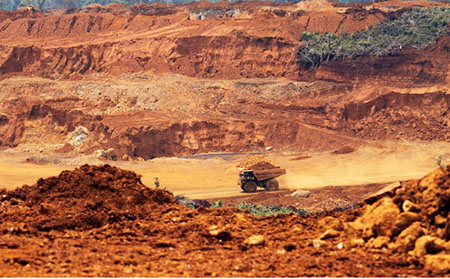by WorldTribune Staff, December 1, 2022
In mining the metals needed for its electric vehicle industry, China has created an environmental catastrophe in Indonesia that might never be cleaned up, a report said.
In a Nov. 28 report titled “The Dirty Road to Clean Energy: How China’s Electric Vehicle Boom Is Ravaging the Environment”, the tech website Rest of World detailed how “green energy” proponents are ignoring the environmental devastation caused by rushed efforts to dig up the minerals needed for electric vehicle batteries as well as solar panels.

The report highlighted what is happening on the Indonesian island of Sulawesi, noting how the once-unspoiled paradise has been turned into a grim hellscape.
Those who live on the island are devastated by the environmental damage China’s mining has wrought, but “nobody will make an environmentalist propaganda cartoon about Sulawesi or criticize the Chinese corporations that destroyed it, because they make electric vehicles,” Breitbart’s John Hayward noted.
People from the fishing village of Kurisa told Rest of World that their town is “dying” and their way of life is ending because corporations eager to dig up Indonesia’s rich lodes of nickel have poisoned the water and overheated the ocean.
Rest of World noted:
Kurisa resident and fisherman Herdiantxo Anton, 32, told Rest of World that when he was a teenager, the clear water under the houses was full of wildlife, playing hide-and-seek in the coral that grew there. That was before large corporations began to set up nickel-processing factories in the villages nearby.
A few hundred meters from Kurisa is a coal plant that powers the nearby Indonesia Morowali Industrial Park (IMIP), a massive industrial complex occupied mostly by nickel-related industries and managed by a Chinese-Indonesian joint venture. Residents complain that IMIP’s operations, which started in 2015, have led to polluted waters.
“Before, we could see a needle at the bottom,” Anton told Rest of World, gesturing to the waters below a wooden walkway. “Now, it’s all mud.”
In the report, Rest of World slammed the IMIP plant for filling the atmosphere of Sulawesi with “sulfur dioxide, nitrogen oxides, and coal ash.” Residents of the surrounding villages complain of mounting health issues in addition to the loss of their fishing grounds. Residents said they could no longer leave their doors and windows open and were worried about allowing their children to play outdoors.
“We don’t eat fish anymore. We eat coal,” a local woman told Rest of World. Another villager complained of loud drilling operations running around the clock which were launched without any warning to the locals.
Breitbart’s Hayward noted: “Most of Kurisa’s residents belong to an ethnic group called the Bugis, a Sunni Muslim people with ancient traditions who would surely become the beleaguered heroes in a Big Media exploitation narrative if their lands were being ruined by any other industry.”
Auto technology site Jalopnik on Nov. 28 cited the Rest of World report as “the latest example of how the EV transition is not as eco-friendly as the industry makes it out to be. And in many places, including China and surrounding areas, the EV transition is woefully reliant on fossil fuels – not just for charging electric vehicles, but for their production, too.”
Action . . . . Intelligence . . . . Publish
